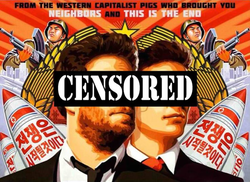The Interview, starring Seth Rogen and James Franco is a comedy about the assassination of North Korea’s leader, Kim Jong-un. Bitterly offended by the film, North Korea called the content an “act of war.” North Korea began making threats during the summer of 2014, going so far as involving the United Nations in an attempt to stop the production of the film. Despite this, Sony Pictures refused to cease production and release of the film. In November 2014, Sony’s computer system was besieged by a series of hacks by a group calling themselves the Guardians of Peace. This eventually culminated in Sony cancelling the release of the film due to threats of further attack in movie theaters. Sony and the United States suspected North Korea of masterminding the cyber-attacks while North Korea vehemently denied any part in it.
The controversy surrounding the film centers on freedom of speech. The reaction to the initial cancellation of the film in Hollywood was intense with concern that censorship in response to threats will set a dangerous precedent where films and other forms of art will be censored in response to threats. President Obama voiced similar concern over the repercussions Sony’s initial decision to cancel the release of the film will have on freedom of speech, as did other politicians from around the world.

Photo Credit: TechCrunch.com
However, not everyone agrees that a film depicting the assassination of the leader of a sovereign nation represents a black and white issue of freedom of speech, especially when it involves a nation with whom we do not have good international relations to begin with. Of further concern was the sympathy some Russian officials lent to North Korea in their reaction to the film, as well as the apprehension of North Korea’s ally, China, to get involved in any blame for the cyber-attacks on Sony Pictures.
Though restricted in some nations, freedom of speech is a human right. However, nowhere is this right without limit. More recently, freedom of speech came up with Pope Francis’ controversial assertions on the limits of freedom of speech in reaction to the terrorist attack on Charlie Hebdo by Islamic extremists.
Out of these recent controversies, questions for the future arise: Can freedom of speech go too far? Could too much freedom of expression result in war? Or will restriction of freedom of expression itself lead to war and violation of human rights? Ultimately, we must find a way to balance the competing interests, preserve our rights and settle our cultural differences peacefully.
Bernadette Shetrone is a 3L law student at University of Denver Sturm College of Law and a Staff Editor for the Denver Journal of International Law and Policy.

